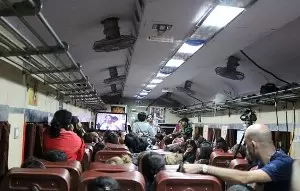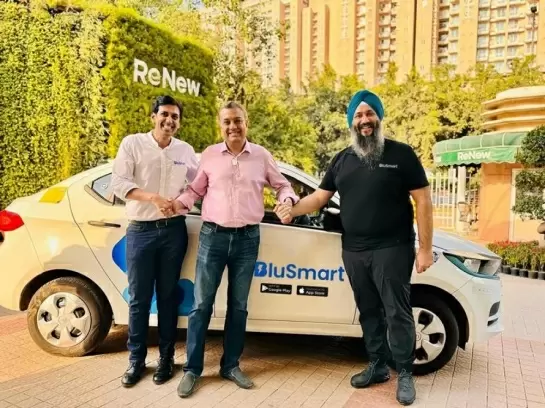Young India travels across country on special train to meet real life heroes
09-January-2012
Vol 3 | Issue 1
One train, 450 youngsters, 15 days, 7,000 km and 13 stops. Overwhelming as the journey sounds, it proved life-changing for those who undertook it, exploring on the way the hidden social enterprise of India.
Jagriti, an NGO, brought together an odd assortment of 'yatris' (travellers with a mission) in a train that criss-crossed the country, exposing them to institutions that have developed unique solutions to India's challenges, in an effort to awaken the spirit of entrepreneurship among them.
.webp) |
|
Participants of Jagriti Yatra 2011
|
Odd because they included both rural and urban, rich and not-so-rich, Indians and foreigners, culturally refined and the street styled, chapati eating and rasam loving, men and women - bound by the common ability to be affected by the socio-economic condition of the country and a dream of bringing in change.
In the fourth year of the Jagriti Yatra, the train passed through Tamil Nadu's Madurai, Andhra Pradesh's Visakhapatnam, Rajasthan's Tilonia, among other places, before culminating in Mumbai.
"The idea is to promote entrepreneurship-led development. Every person who takes part in the yatra goes back a different person," says Jagriti co-founder Swapnil Dixit.
The programme focusses on 20-25 age group of "middle India". "It's the segment between the rich and poor -- where your per day income is Rs.40-120. We want to convert these job seekers into job creators," Dixit said.
An Indian Railways train was booked for the Dec 24-Jan 8 journey with specially equipped bathrooms and private caterers.
Around 15,000 people registered, of whom 450 were selected on the basis of a questionnaire. There were 35 foreign nationals from countries as diverse as Israel, Britain, South Africa and Argentina. "We include foreigners as they give an outsider's perspective to things," Dixit said.
But as theatre director Lewis Hallam famously put it, 'a journey is not undertaken without money', the yatra cost Rs.34,000 per person. And for those who couldn't afford it, it was just Rs.4,000 as the sponsors took care of the rest.
At a stopover for the yatris in Delhi, there was electrifying energy in the packed Kamani auditorium. The hall resonated with words like "amazing", "awe-inspiring", "incredible", "challenging" as participants sat down to review the journey.
"When you put 450 smart, bright people in a crazy train, amazing things happen. You have real high-level conversations about philosophy, education, history and everything," said Shay Eyal, owner of a start-up firm in Israel, shouting to make himself heard in the noise.
Then there was Abdul Kaleem from Uttar Pradesh's Deoria who participated as he wanted "to work for a sustainable model of education" in his district.
The participants got to witness the development taking place in the far corners of the country through innovative development initiatives, and interacted with those at the forefront of change.
The gender ratio inside the train was 60 males to 40 females.
According to Quinton Fivelman, currently working in Britain, "the train is like a pressure cooker with many cultures coming together. When you live in a small place, there's certain intimacy you develop."
"Some people from south India hadn't even got their winter clothes because they had never been to cooler climates, so there was a lot of sharing," said Fivelman.
The participants met Infosys' N.R. Narayan Murthy; S. Aravind, who founded one of the most productive eye care facilities in Madurai; R. Elango, credited with transforming Kuthambakkam Village in Chennai, among other role models.
 |
|
A scene inside the special Indian Railway train booked for the tour
|
But how much of this initiative leads to tangible results? "Around 120 of our ex-participants have become entrepreneurs," said Dixit.
Britain's Richard Russell had been working in an Odisha NGO for a year. Ask him about his train experience and he takes a moment's pause to put his thoughts in order.
"I've been able to learn about enterprise models and ways of approaching development problems. We went to a village transformed by solar power, another one redeveloped by social enterprise," said Russell. - IANS.














